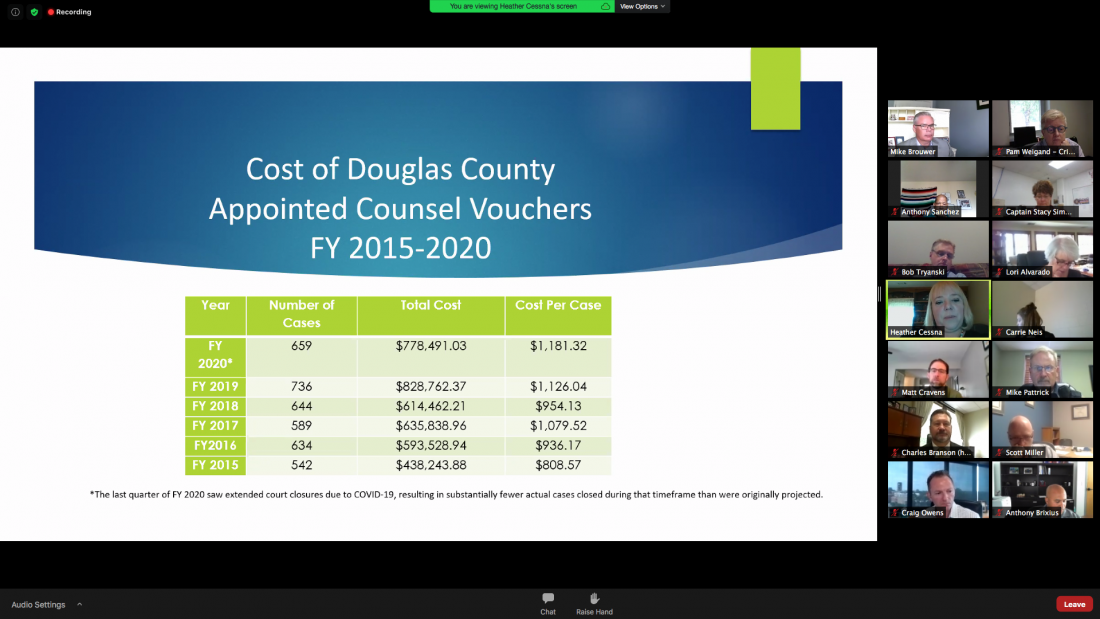A public defender office for Douglas County? Criminal justice council hears about possible advantages, costs, process to implement

photo by: Screenshot
This screenshot shows a meeting of the Douglas County Criminal Justice Coordinating Council on Aug. 11, 2020. In the top row, second from the right, is Heather Cessna, executive director of the Kansas Board of Indigents’ Defense Services, or BIDS. She gave a presentation on the possibility of a public defender office in Douglas County.
Even if Douglas County decided today that it wanted to pursue a public defender office, it would take years to implement, the county’s Criminal Justice Coordinating Council heard at its meeting Tuesday.
The concept of such an office has come up in discussions during other recent CJCC and Douglas County Commission meetings as well as during forums in the recent race for Douglas County district attorney.
Heather Cessna, executive director of the Kansas Board of Indigents’ Defense Services, or BIDS, and a former longtime appellate defender, gave a presentation about the possible advantages of a local public defender office, what it might cost and the “lengthy” process it would require.
A majority of adult felony cases — 85% statewide — require appointed counsel, Cessna said.
Douglas County currently has a list of private attorneys who voluntarily take appointed cases, Cessna said. They are paid through BIDS for the cases they take, but they are not public defenders. In fiscal year 2019, BIDS paid about $829,000 to attorneys in 736 adult felony cases in Douglas County, according to Cessna’s presentation.

photo by: Screenshot
This screenshot shows a presentation to the Douglas County Criminal Justice Coordinating Council on Aug. 11, 2020. Heather Cessna, executive director of the state Board of Indigents’ Defense Services, said Douglas County’s numbers for fiscal year 2020 should be considered outliers because BIDS generally receives vouchers and pays attorneys when cases are over; due to the coronavirus pandemic, however, many cases have been stalled in the court system over the past several months.
Cessna said there are 18 public defender offices throughout the state. She said counties that do have public defender offices also have lists of attorneys who take appointments when the public defenders have conflicts or their caseloads are too great.
“One of the things I wanted to point out is that having a public defender in your community is a certain amount of institutional support that otherwise does not exist,” Cessna said.
For instance, she said the office provides immediate supervision of the attorneys who are operating in the criminal justice system, caseload controls and resources that private attorneys would not have. Among those resources are all the other public defenders in the statewide system, including appellate and capital offense defenders, who can provide consultations and assistance when needed.
Cessna said BIDS’ rough estimate of what it would cost to operate a public defender office in Douglas County, based on offices of similar sizes, would be about $810,000 per year. It could change depending on rent for an office space and things of that nature, she said.
Cessna said the BIDS board would consider a request from people of Douglas County to look into a local public defender office, such as a letter or a request at a public meeting. She said it might help to have a more formal request, and a show of support, or lack thereof, from the local community could factor into the board’s decision.
If at least two of nine BIDS board members vote in favor of considering it, the BIDS administration would work up a cost-benefit analysis; then a public hearing would be held. The board would then consider the question again at a public meeting and hold a vote on whether to approve a change to the local system.
Then the board would have to secure state funding, which would require support from the governor and the Kansas Legislature. She said that process can be lengthy and “somewhat of a rollercoaster” even in the best fiscal years.
BIDS is currently in the process of budgeting for FY 2022, and it would take until the Kansas Legislature’s 2022 session before BIDS would know if it could even get funding for a Douglas County office, Cessna said.
Pam Weigand, the county’s director of criminal justice services, asked whether a public defender office could provide representation for defendants at their first appearances in court. Currently, counsel is appointed for indigent defendants during those hearings, so they have no legal advice when they’re first charged and have the opportunity to talk to the judge about their bond.
Cessna said a fully staffed public defender office would be able to cover first appearances; right now, only Johnson County has representation at first appearances because of staffing issues at other offices.
In other business:
• Douglas County District Court Chief Judge James McCabria spoke about the court’s role in the CJCC. He said he wanted to ensure that the public knows that positions of the CJCC do not reflect the positions of the 7th Judicial District as a whole, in case the public has concerns that the court’s representation on the council might compromise the independence of the judiciary.
Mike Brouwer, Douglas County criminal justice coordinator, said it’s the CJCC’s job to provide the information that local leaders can use when making decisions about policies and practices, rather than to take action itself.
• A discussion about data on the number of individuals with serious mental illness booked into the Douglas County Jail last year was tabled for the September meeting.
• Also at the September meeting, there will be a discussion of data on jail bookings for failures to appear over the last three years.
Contact Mackenzie Clark
Have a story idea, news or information to share? Contact public safety reporter Mackenzie Clark:





